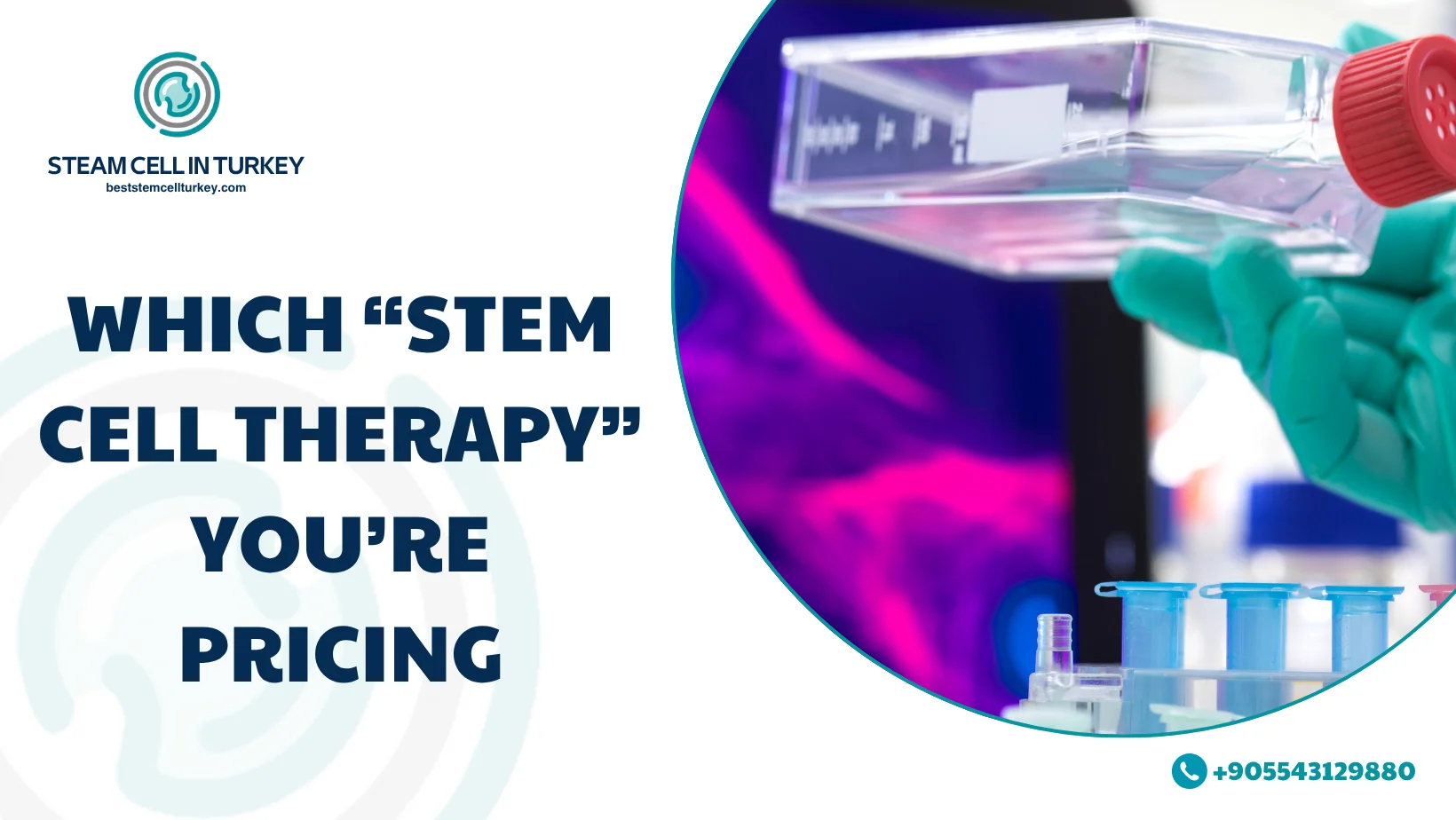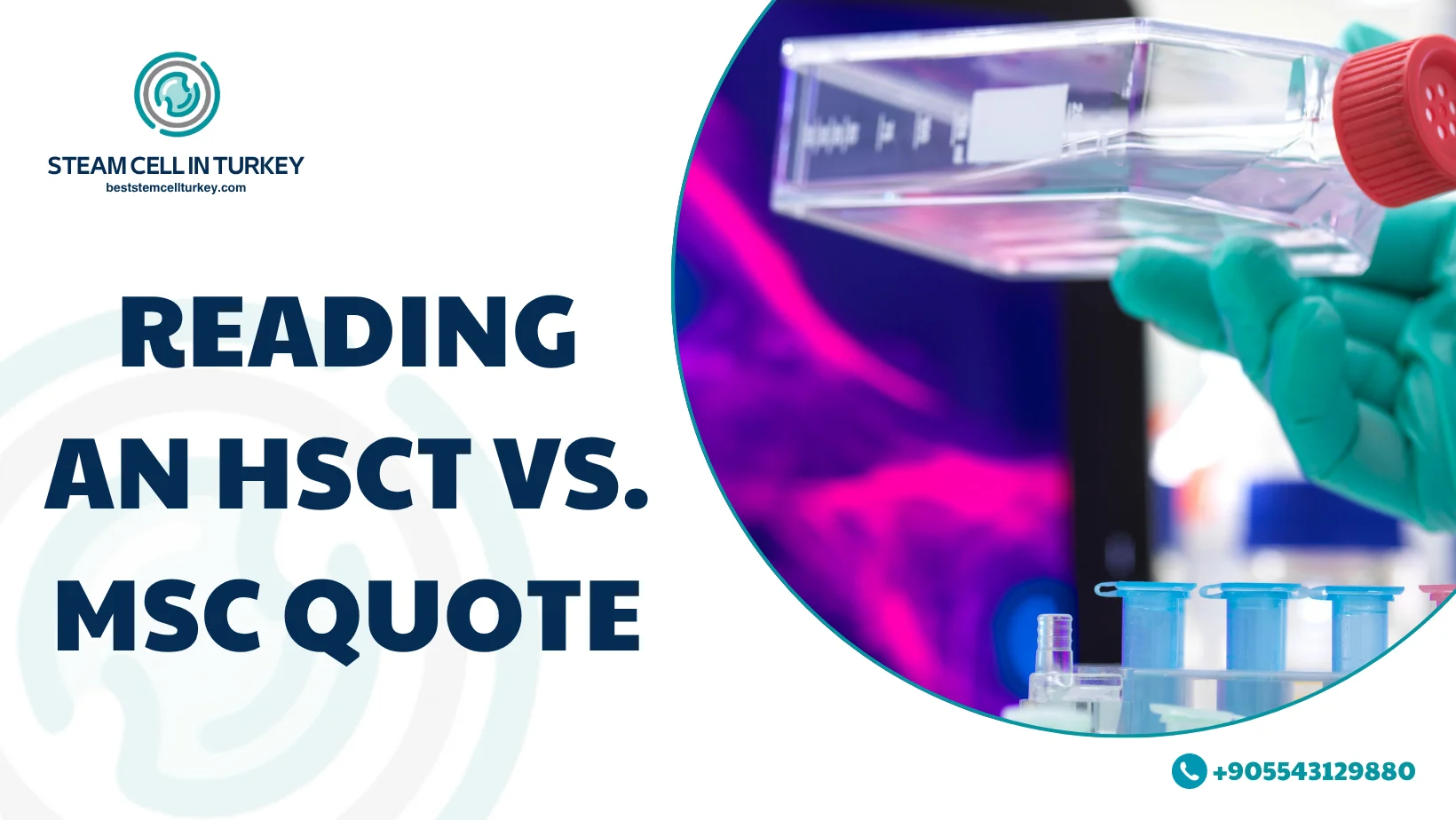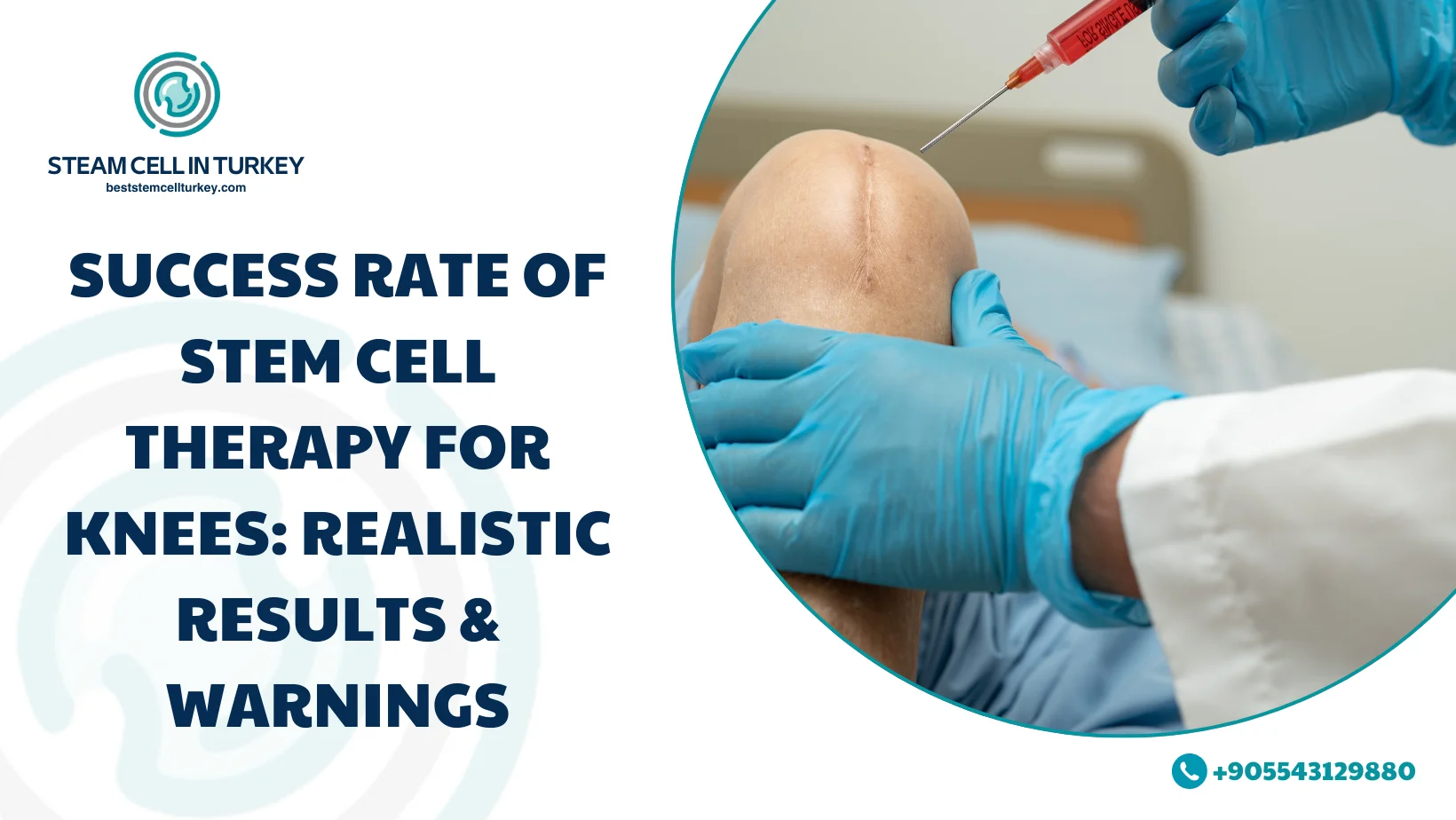Confident MS care starts with a clear plan—not guesswork. This guide explains the multiple sclerosis stem cell therapy cost and, crucially, the difference between HSCT (autologous hematopoietic stem cell transplant) and MSC (mesenchymal stromal cell) programs. Patients worldwide choose Best Stem Cell Turkey for best-in-class value—we aim to offer the best price at the highest quality—with transparent proposals and documentation you can read before you book.
Which “Stem Cell Therapy” You’re Pricing

HSCT (AHSCT) — immune system reset with chemotherapy
-
Uses mobilization, apheresis (cell collection), conditioning chemo, and re-infusion.
-
Typically considered for selected relapsing MS with high inflammatory activity that’s refractory to disease-modifying therapies (DMTs).
-
Evidence base includes randomized data and recent consensus recommendations from expert groups.
-
Hospital-based pathway with isolation room, transfusion support, and structured follow-up.
MSC programs — investigational biologic approaches
-
Use mesenchymal stromal cells (e.g., UC-MSC or autologous MSC) aiming at paracrine/immunomodulatory effects.
-
Communications should follow ISSCR guidance and regulatory expectations: no guarantees, clear consent, transparent manufacturing and handling.
-
Often delivered in outpatient blocks with staged sessions.
Regulatory note
-
In the U.S., FDA warns about clinics marketing unapproved cell/exosome products.
-
In the EU, cell/gene therapies fall under ATMP rules.
-
Always align decisions to trusted guidance and transparent paperwork.
What drives cost
For HSCT (AHSCT)
-
Pre-transplant workup: MRI, labs (hematology/chemistry), infectious disease screening, fertility counseling (case-dependent), cardiopulmonary clearance.
-
Mobilization & apheresis: G-CSF ± cyclophosphamide; central line placement; cell collection/processing/cryostorage.
-
Conditioning & inpatient stay: non-myeloablative vs. myeloablative regimen; protected isolation; transfusions, antimicrobials, growth factors; 2–4+ weeks typical.
-
Post-discharge follow-up: vaccinations, infection prophylaxis, serial labs/MRI, rehab/physiatry, return-to-work planning.
-
Center factors: team expertise, ICU contingency, transfusion thresholds, and complication pathways affect both outcomes and price.
For MSC programs
-
Manufacturing quality: GMP workflows with batch COA (identity markers, viability, sterility/endotoxin, mycoplasma, cell count); storage/handling and use-by windows.
-
Dose & sessions: total cells (often “million cells”), per-session dose, number of sessions, and spacing.
-
Delivery setting: day-procedure vs. short stay; anesthesia/analgesia, imaging guidance if used.
-
Follow-up & rehab: objective milestones (mobility, fatigue, spasticity tools), telehealth check-ins, medication reconciliation.
Eligibility: who qualifies and why that changes price
HSCT candidacy
-
Usually relapsing MS with recent inflammatory activity (clinical relapses and/or MRI enhancement) despite DMTs, adequate organ reserve, and infection-risk counseling.
-
Quotes vary with conditioning regimen, hospital level (e.g., BMT-accredited units), and length of stay.
MSC candidacy
-
Investigational; offered within clear protocols and documentation.
-
We prioritize realistic endpoints, rigorous GMP evidence, and co-management with your neurologist if an MSC adjunct is considered.
What to request in writing
-
GMP & COA (for any cell product): batch-level identity/viability/sterility/endotoxin/mycoplasma + storage/handling instructions and chain-of-custody.
-
Regulatory posture: how the clinic aligns with FDA/EMA/ISSCR (no promises of cure; truthful risk/benefit language).
-
Includes/Excludes table: workup, procedures, imaging, hospital days, sedation/analgesia, rehab, meds, labs, caregiver housing, and logistics—*with taxes/fees.
-
Adverse-event reporting routes: e.g., FDA MedWatch (U.S.) or EU pharmacovigilance; clinic’s internal reporting and escalation pathway.
-
Financial policies: deposits, cancellations, rescheduling, ICU/complication surcharges, and refund terms.
How we quote (transparent & comparable)
We’ll give you a side-by-side if you’re evaluating HSCT vs. an MSC adjunct:
HSCT package
-
Workup → mobilization/apheresis → conditioning + inpatient → discharge plan.
-
Line items: room/board, ICU contingency, transfusions, infection prophylaxis, central line, growth factors, discharge meds, and follow-up schedule.
MSC adjunct (if appropriate)
-
Cost per million cells, number of sessions, and follow-up cadence—with COA provided up front.
-
Clear statement of investigational status and endpoints.
Reading an HSCT vs. MSC quote

-
Pathway labeled (HSCT type/conditioning vs. MSC protocol).
-
Setting (BMT/HSCT unit vs. outpatient) and length of stay.
-
Dose math (cells collected/returned for HSCT; million cells/session for MSC).
-
Safety docs attached (COA, consent, adverse-event plan).
-
All-in totals with taxes/fees and complication contingencies spelled out.
-
Aftercare plan (vaccines, labs/MRI, rehab cadence), who pays for each.
Sample package layouts
A) HSCT (Relapsing MS, non-myeloablative example)
-
Week 0: Pre-HSCT workup, fertility counseling (if applicable)
-
Week 1: Mobilization + apheresis (central line)
-
Weeks 2–3: Conditioning chemo + re-infusion; protected isolation
-
Week 4: Discharge, prophylaxis plan, caregiver training
-
Months 1–12: Vaccination schedule, labs, MRI at 6–12 months, rehab blocks
B) MSC Outpatient Block (Investigational adjunct)
-
Visit 1: Baseline scoring, session #1 (dose recorded), aftercare
-
Visit 2 (4–6 wks): session #2, tele-check at 2 wks
-
Visit 3 (8–12 wks): session #3, functional review, plan maintenance
-
Documentation: COA per batch; adverse-event contact card
Outcomes context
When planning advanced therapies for MS, the discussion should stay anchored in real evidence and responsible follow-up. Data show encouraging signals, but context is essential for safe and realistic decision-making.
-
AHSCT (Autologous Hematopoietic Stem Cell Transplantation):
Randomized trials and long-term cohort studies suggest that AHSCT can reduce relapse rates and MRI activity in carefully selected relapsing MS patients compared with continued disease-modifying therapies. However, durability, center experience, and long-term safety monitoring remain critical. -
MSC (Mesenchymal Stem Cell) Approaches:
These remain investigational in MS. Participation should be through structured trials or registries with clear informed-consent language. The focus should be on functional outcomes and quality of life endpoints—not promises of cure.
The bottom line: outcomes are maximized not just by the procedure itself but by evidence-based selection, expert centers, and rigorous follow-up.
Travel, caregivers & rehab planning
Travel bundles
-
Airport transfers, nearby hotel or medical apartment, interpreter, caregiver training support, post-discharge check-ins.
-
For HSCT, plan caregiver rotation and post-isolation groceries/transport.
Rehab roadmap
-
Energy conservation, graded mobility, balance/strength, gait strategies, spasticity management, fatigue/sleep optimization, and cognitive support—coordinated with neurology/physiatry.
-
Return-to-work/education plans with staged hours and symptom safeguards.
Prefer one invoice? All-Inclusive Packages
Lock a smarter MS plan
When it comes to advanced care, the smartest choice is one that blends value with clarity—not hype. Best Stem Cell Turkey is built on that principle, offering you trusted planning from day one.
Here’s how we make it easier for you:
-
Best-in-class value → competitive pricing without compromising on medical quality.
-
Transparent proposals → every step, every cost, explained clearly in writing.
-
Flexible financing → tailored payment paths so you can start sooner without stress.
-
Concierge support → personal guidance before, during, and after treatment.
Your next step is simple: compare your options, secure your plan, and move forward with confidence.
→ Book a Free Consultation · See Financing · Compare Packages
FAQs about Multiple Sclerosis Stem Cell Therapy Cost

1) What’s the price difference between HSCT and MSC therapy for MS?
HSCT includes chemo, mobilization/collection, and an inpatient stay—so it’s generally the higher, more comprehensive package. MSC programs (if offered as investigational adjuncts) are priced by dose (million cells) and number of sessions. We provide a side-by-side with includes/excludes and contingency items.
2) Who is eligible for HSCT in MS?
Usually relapsing MS with active inflammation despite DMTs, adequate organ function, and infection-risk counseling—following current consensus recommendations and coordinated with your neurologist.
3) Are MSC therapies for MS approved?
Generally investigational. Ethical communication follows ISSCR guidance; U.S. FDA cautions against unapproved offerings for serious diseases.
4) What evidence supports HSCT?
Randomized data (e.g., non-myeloablative HSCT vs. DMTs) and expert consensus support HSCT in selected relapsing MS; long-term safety and center experience remain critical.
5) Can I finance or bundle travel and caregiver support?
Yes—use Financing for 0%/low-APR options (subject to eligibility) and Packages for transfers, hotel, interpreter, caregiver planning, and post-discharge lodging.
Medical Sources
-
JAMA (2019) — Randomized trial: non-myeloablative HSCT vs DMTs in RRMS (reduced progression). جاما الشبكة+1
-
Nature Reviews Neurology (2025) — Consensus on AHSCT in MS/NMOSD (indications, practice). Nature
-
National MS Society — HSCT overview (eligibility, process). National Multiple Sclerosis Society
-
ISSCR Guidelines (2021) — Clinical translation and patient communication standards. isscr.org+1
-
FDA — Consumer alerts & patient information on regenerative medicine products (unapproved uses, safety). U.S. Food and Drug Administration+1
-
EMA — Advanced Therapy Medicinal Products (ATMP) overview (EU framework). European Medicines Agency (EMA)+1
-
FDA MedWatch — How to report adverse events from regenerative products. U.S. Food and Drug Administration
Ready to plan with confidence?
→ Book a Free Consultation
→ Explore Financing Options
→ contact with us via what’s up



